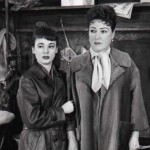New York Times critic Ben Brantley believes Gypsy “may be the greatest of all American musicals.” He is not alone. Previous Times critic Frank Rich considers the show to be “Broadway’s own brassy, unlikely answer to King Lear.” The Lear of the musical is not Gypsy, though, but her mother, Rose, whom fellow Times critic Clive Barnes has described as “one of the few truly complex characters in the American musical.” Lyricist Stephen Sondheim has described Rose as “a very American character, a gallant figure and a life force.”
When producer David Merrick read a chapter of Gypy Rose Lee’s 1957 memoir in Harper’s Magazine, he immediately sought the musical rights. Ethel Merman and Jerome Robbins were soon onboard, and Merrick then approached Arthur Laurents to write the book. Laurents found his way into the story by focusing on how Rose, the ultimate show-business mother, lived her life through her children.
Irving Berlin and Cole Porter were both asked but declined to write the score, so Robbins asked Stephen Sondheim (whom he and Laurents had just worked with on West Side Story). Sondheim agreed, but Merman didn’t want an unknown composer, so Jule Styne was enlisted to write the music to Sondheim’s lyrics.
After tryouts in Philadelphia and New Haven, the show opened May 21, 1959, on Broadway, directed and choreographed by Jerome Robbins and starring Merman as Rose, Sandra Church as Gypsy, and Jack Klugman as Herbie. The production received eight Tony nominations, including Best Musical, but failed to win a single trophy. After two years and 702 performances, Merman took the show on the road across America in 1961. The following year, the film adaptation premiered, with Rosalind Russell as Rose, Natalie Wood as Gypsy, and Karl Malden as Herbie.
There have been numerous productions since then. Gypsy made its West End debut in 1973, with Angela Lansbury as Rose, directed by Arthur Laurents. Lansbury took that production on a 24-week tour of North America, ending with a run on Broadway in 1974. The second Broadway revival opened in 1989, starring Tyne Daly as Rose, again with Laurents as director. The next major production was the 1993 TV adaptation with Bette Midler. The show then saw two more Broadway revivals: one in 2003 with Bernadette Peters and one in 2015 with Patti LuPone. An acclaimed West End revival opened in 2015, with Imelda Staunton. That production was filmed for TV and released on DVD in 2016.
There are recordings of each of the above productions, but the 1959 original cast remains definitive. That album stayed 116 weeks on the Billboard charts, peaking at #13, and was inducted into the Grammy Hall of Fame in 1998. It also won a Grammy, as did the 2003 revival album with Peters, whom Laurents described as “brilliant, original.”
For more about the show’s creation, read Keith Garebian’s The Making of Gypsy (1994).
NEXT, for a quieter backstage tale, listen to the inventive 1961 musical Carnival (book by Michael Stewart, score by Bob Merrill), based on the 1953 film Lili, about a French waif’s relationship with a carnival puppeteer.
THEN, explore the backlot world in the 1982 musical Nine (book by Arthur Kopit, score by Maury Yeston), an equally inventive show based on Federico Fellini’s semi-autobiographical film 8½, about a film director facing a midlife crisis.

